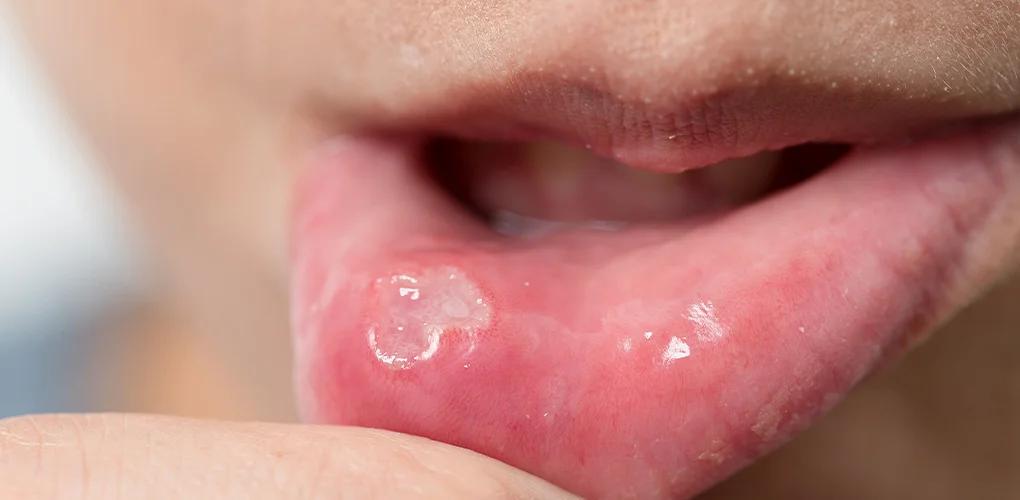`
How to Heal Mouth Sores Quickly: Expert Tips and Remedies
A mouth sore or oral ulcer is the erosion of the lining of soft tissues inside mouth. They can appear on gums, lips, tongue, inner lining of cheeks or roof of mouth. Mouth Sores are usually a minor irritation and heal within 10-15 days. Mouth sores on gums usually occur due to stress or minor injuries.
Some non-healing oral ulcers can indicate a more serious condition like an infection or mouth cancer. Persistent non-healing mouth sores on tongue (especially lateral border) is alarming. Oral cancers commonly manifest on the tongue, lower lip or floor of the mouth.
Reasons for mouth sores can range from minor injuries, hormonal changes, emotional stress, trauma, environmental factors, or genetic factors. The management of mouth sores depends on the type and reason of occurrence.
Types of Mouth Sores
There are different types of mouth sores depending on their appearance, site, and causative factor. Following are the types of mouth sores:
Cold Sores: Cold Sores are fluid like blisters, commonly seen on lips. They are commonly caused by herpes simplex type 1 virus (HSV1). HSV1 is a contagious virus and can spread by contacting a person with cold sores.
Canker Sores: These are small oval-shaped ulcers that appear as white, grey, or yellow. These are also called aphthous ulcers. They are mostly harmless and heal on their own.
Oral lichen planus: Oral lichen planus cause itchy white sores inside mouth. These lesions are commonly seen in women of 50 years or older.
Leukoplakia: Leukoplakia appear as white or gray patches because of excess cell growth. They are caused by smoking or tobacco products. Leukoplakia is not usually cancerous.
Erythroplakia: Erythroplakia appear as red patch under tongue or behind lower front teeth. These are caused by smoking. They are usually precancerous or cancerous lesions.
Mouth cancer: Mouth cancers initiate as red or white sore in mouth. These sores are painful and do not heal on their own.
Causes of Mouth Sores
Mouth sores occur because of irritation or deficiency. Possible mouth sores cause includes:
- Poorly fitting dentures
- Sharp or broken tooth
- Braces
- Tobacco products
- Medications
- Highly acidic foods
- Stress
- Vitamin and folate deficiencies
Symptoms of Mouth Sores
Mouth sores can easily be seen as they appear as erosion of lining tissues. They can appear on lips, gums, tongue, cheeks, or roof of the mouth. Here are typical symptoms of mouth sores:
- Pain and discomfort
- Redness
- Swelling
- Difficulty in eating or speaking
- Burning or tingling sensation
- Fever
- Diarrhea
Treatment Options for Mouth Sores
Most of the mouth sores heal on their own. Professional dental care for mouth sores is needed for non-healing or recurrent oral ulcers. Common mouth sores treatment may include:
- Over-the-counter medicines (painkillers)
- Alcohol-free mouthwash
- Steroid gels
- Antibacterial or antiviral to treat infection
- Immunosuppressants in severe cases
- Lifestyle changes to prevent mouth sores
Mouth sores can easily be spotted by a person with himself without professional’s diagnosis. For that reason, a person can do certain lifestyle changes to prevent or ease the symptoms of mouth sores:
- Rinse with saltwater four times a day
- Avoid spicy or hot foods
- Good hygiene practices with regular dental visits
- Quit smoking or tobacco products
- Limit alcohol intake
Prevention of Mouth Sores
It is hard to prevent all mouth sores but following measures can be taken to lower the chance of occurrence:
- Avoid extreme hot foods and drinks
- Use a soft bristle brush
- Maintaining oral hygiene
Consult a dentist if a denture or dental appliance irritates mucosal lining.
- Control stress
- Eat a balanced diet
- Drink plenty of water
- Avoid smoking or quit tobacco
- Avoid or limit alcohol consumption
When to see a Doctor for Mouth Sores
It is advised to visit regularly for routine checkups. Mouth sores usually heal in 10-15 days but if they persist or any of the symptoms mentioned below occur, then a person should schedule an appointment with a dentist.
- Painful sores
- Mouth sores with fever
- Persistent or recurrent sores
- Large and non-healing sores
- Mouth sores increasing with time
Oral Health and Mouth Sores
Mouth sores commonly occur due to trauma from ill-fitting dentures or fractured teeth. Mouth sores can cause dryness in oral cavity that increases the risk of dental decay and gum diseases. Mouth sores disrupt routine oral care due to irritation and discomfort. Non-healing sores and poor oral hygiene increase the risk of oral cancers.
Impact of Mouth Sores on General Health
Usually mouth sores are self-healing and do not cause any effect to the body. Some of the non-healing oral ulcers cause dehydration and malnutrition due to pain while eating and drinking. This can increase the risk of autoimmune diseases or gastrointestinal problems.
Complications of Untreated Mouth Sores
Mouth sores cause severe complications if left untreated.
- Dental infection
- Cellulitis
- Oral cancer
- Risk of spread of contagious diseases
- Fatigue
- Discomfort while talking, eating, drinking, or brushing
Myths and Facts About Mouth Sores
Mouth sores commonly cause pain and discomfort until they are healed. Mouth sores are confusing and can be misdiagnosed with other dental conditions. People commonly encounter myths about mouth sores. Here are some myths and facts about mouth sores.
Myth: Only adults can have mouth sores.
Fact: This is absolutely wrong. Anyone can have mouth sores regardless of age.
Myth: Mouth sores are always a sign of oral cancer.
Fact: This is not true because most mouth sores heal themselves.
Myth: Only smokers can get mouth sores
Fact: This is not always true, people with vitamin deficiency and stress can also have oral ulcers.
`

